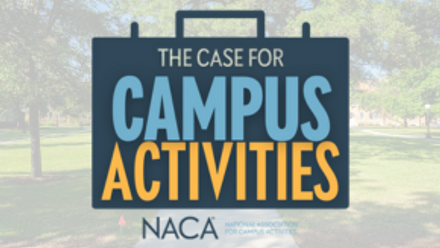Navigating the Upcoming US Election: Considerations for Campus Activities Professionals
As the upcoming US election approaches, college campuses across the country will likely become hotbeds of political activity, discourse, and, potentially, unrest. For campus activities professionals, this period can be both challenging and rewarding. While fostering civic engagement and providing students with opportunities to express their views are critical aspects of your role, you must also prepare for the possibility of protests, unrest, and disappointment in the election outcome among students.
NACA has prepared a new Considerations for Preparing for the Upcoming Election resource aimed at helping NACA members think about how to prepare for and adapt to the upcoming US election in 2024. The questions posed can be utilized for personal reflection and advocacy, department conversations, and/or student dialogue.
Included below are a few high level components of the various considerations provided within the new resource.
- Foster Open Dialogue and Civic Engagement - The election presents a unique opportunity to engage students in meaningful dialogue about the democratic process. Organize events such as debate watch parties, panel discussions, or forums where students can discuss key issues. These events should be inclusive, allowing for a diversity of opinions and encouraging respectful discourse. By providing a structured environment for political discussions, you can help prevent the spread of misinformation and reduce the likelihood of heated confrontations. Additionally, consider collaborating with academic departments, student government, and other campus organizations to create programs that educate students on the importance of voting, the electoral process, and the issues at stake. This will empower students to make informed decisions and participate actively in the democratic process.
- Anticipate and Prepare for Protests - Protests are a common form of political expression, especially on college campuses. While most protests are peaceful, it’s essential to be prepared for situations that could escalate. Work closely with campus security to develop a plan that ensures student safety while respecting their right to protest. Identify potential protest areas on campus and ensure they are equipped to handle large gatherings. This includes considering crowd control, access to medical services, and communication channels in case of emergencies. It’s also important to train staff on how to de-escalate tense situations and provide support to students who may feel threatened or unsafe.
- Support Student Mental Health and Well-being - The outcome of the election, regardless of the result, may lead to feelings of disappointment, anxiety, or even despair among students. It’s crucial to have resources in place to support students’ mental health during this time. Work with your campus counseling center to ensure that mental health services are accessible and that students are aware of how to seek help. Consider offering group counseling sessions or workshops that focus on managing stress and anxiety related to political uncertainty. Additionally, create spaces where students can come together to process their emotions in a supportive environment, whether through peer support groups or informal gatherings.
- Communicate Clearly and Effectively - Clear communication is key to managing campus activities during the election. Keep students informed about upcoming events, potential disruptions, and available resources. Utilize multiple communication channels, including social media, email, and campus bulletin boards, to reach as many students as possible. It’s also important to communicate with your staff and colleagues. Ensure that everyone is on the same page regarding plans for election-related events and potential responses to unrest. Regularly update your team on any changes or developments, and encourage open lines of communication so that issues can be addressed promptly.
- Promote Inclusivity and Respect - The election season can exacerbate divisions among students with differing political views. As a campus activities professional, it’s your role to promote an environment of inclusivity and respect. This means not only encouraging respectful discourse but also actively working to prevent discrimination or harassment based on political beliefs. Consider organizing events that highlight the importance of unity and community, even in times of political disagreement. Remind students that, while they may have different perspectives, they are all part of the same campus community and should treat each other with kindness and respect.
- Evaluate and Learn - After the election, take the time to evaluate how your campus managed the challenges and opportunities presented by the political season. What worked well, and what could be improved? Gather feedback from students, staff, and other stakeholders to identify areas for improvement. Use this information to plan for future elections or other significant events that may impact your campus. By continuously learning and adapting, you can better support your students and create a campus environment that encourages civic engagement, critical thinking, and mutual respect.
The upcoming election is likely to be a significant event on college campuses, bringing with it both opportunities for engagement and challenges to navigate. By fostering open dialogue, preparing for protests, supporting student mental health, communicating effectively, promoting inclusivity, and evaluating your efforts, you can help guide your campus through this period with empathy, foresight, and professionalism. Your role in shaping the campus environment during this critical time is invaluable, and with careful preparation, you can help ensure a positive and constructive experience for all students.
In addition to the Considerations resource, NACA has many resources in its online Resource Library on preparing for elections, fostering civil discourse, and programming ideas. If your campus has unique approaches, solutions, or ideas, consider engaging in the NACA Connect community, submitting a blog, or even writing a magazine article for future publication. While elections can prove to be stressful and challenging, we encourage you to lean on your NACA community for support and ideas.






